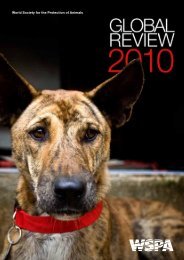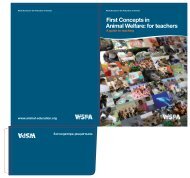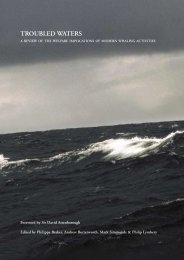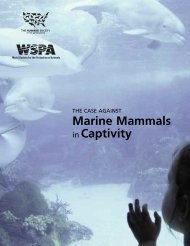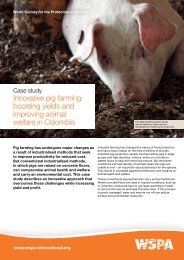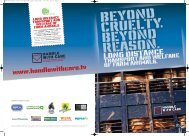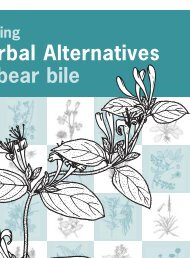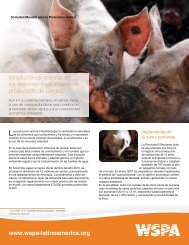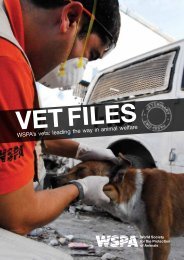Proceedings of the Untangled symposium: - WSPA
Proceedings of the Untangled symposium: - WSPA
Proceedings of the Untangled symposium: - WSPA
You also want an ePaper? Increase the reach of your titles
YUMPU automatically turns print PDFs into web optimized ePapers that Google loves.
Annex 4Submitted abstracts accompanyingposter presentationslooking into <strong>the</strong> problem <strong>of</strong> discarded equipment from<strong>the</strong> fishing and <strong>the</strong> fish farming industry.Traditionally <strong>the</strong> Norwegian oceans have been known tobe a place to dump waste, and it magically disappears.Norway has a 25150 km coastline with an active fishingfleet <strong>of</strong> 6500 vessels which constitutes 0,7 % <strong>of</strong> GDP.Rough wea<strong>the</strong>r, long distances and high landfill pricescombined leads to big amounts <strong>of</strong> fishing gear finding itsway to sea each year, adding to <strong>the</strong> continuously growingproblem <strong>of</strong> ghost fishing and entanglement <strong>of</strong> marinewildlife. The high quality <strong>of</strong> <strong>the</strong> equipment used in <strong>the</strong>Norwegian Sea and North Sea, <strong>the</strong> low temperature anddepths let <strong>the</strong> equipment continue to fish for decadesbefore it ends up at <strong>the</strong> sea floor. The Greenland Halibutespecially is in some areas threatened by extinction dueto lost gillnets.All equipment collected through N<strong>of</strong>ir is dismantled,packed and sold to European plastic recyclers. Plasticcomes in various types and has different values.While some equipment is easily traded, o<strong>the</strong>rs arenot considered resources in <strong>the</strong> market today. Selling<strong>the</strong> most valuable fractions, makes us able to financecollecting <strong>the</strong> discarded equipment for free, look forsolutions for <strong>the</strong> less valuable and participate in <strong>the</strong> workfor an attitude change in <strong>the</strong> Norwegian fisheries.Even though we experience a growth in <strong>the</strong>environmental consciousness <strong>of</strong> <strong>the</strong> fishermen andfish farmers in Norway, still <strong>the</strong>re is a long way to goto achieve zero dumping. This is best shown by <strong>the</strong>vast amounts <strong>of</strong> equipment The Norwegian Directorate<strong>of</strong> Fisheries collects when <strong>the</strong>y arranges <strong>the</strong> yearlytrawling mission for lost and abandoned equipment.All equipment pulled out <strong>of</strong> <strong>the</strong> sea is recycled through<strong>the</strong> N<strong>of</strong>ir system.It is estimated that 64 000 tons <strong>of</strong> fishing equipment islost or dumped at sea each year on a European leveland this creates <strong>the</strong> need to coordinate a recycling effortacross Europe. N<strong>of</strong>ir aims to solve this challenge and hasin September 2012 launched EUfir. As <strong>the</strong> first Norwegiancompany we have been accepted by <strong>the</strong> European UnionCommission and will receive funding through <strong>the</strong> EcoInnovation program to make N<strong>of</strong>ir European.The role <strong>of</strong> state policy on cleanup <strong>of</strong> lobster trapsin Maine and New Hampshire, and a case study <strong>of</strong> asuccessful cleanupJennifer L. Kennedy 1 ; Gabriela Bradt 21Blue Ocean Society for Marine Conservation143 Pleasant Street, Portsmouth, NH 03801, USAjen@blueoceansociety.org2New Hampshire Sea Grant/UNH Cooperative ExtensionSince 2007, Blue Ocean Society for Marine Conservationhas worked with New Hampshire Sea Grant andUniversity <strong>of</strong> New Hampshire Cooperative Extension tocharacterize and mitigate marine debris from sou<strong>the</strong>rnMaine to nor<strong>the</strong>rn Massachusetts, and in <strong>the</strong> Gulf <strong>of</strong>Maine. This involves shoreline cleanups, underwatersurveys, and a derelict gear collection bin program.Lobster traps provide a significant portion <strong>of</strong> <strong>the</strong>debris found during shoreline and underwater surveys.Potential impacts include entanglement and entrapment<strong>of</strong> marine life (e.g., cetaceans, pinnipeds, fish andinvertebrates) in ropes and traps, use as habitat fornative or invasive species, and loss <strong>of</strong> fishing time dueto interactions with derelict gear. In a study <strong>of</strong> <strong>the</strong>impacts <strong>of</strong> derelict lobster traps in 2010 and 2011,Glenn, et. al (2012) documented 23 different species(including lobsters, 3 crab species, fish and invertebrates)in abandoned traps in Cape Cod Bay and BuzzardsBay, MA. Mattila and Lyman (2010) stated that, regardinglarge whales, “ghost gear can complicate an existingentanglement,” and noted a case where a humpbackin New England had become entangled in a net - anentanglement that was complicated by several derelictlobster traps that had become attached. They alsoremarked upon previous studies that stated that it isdifficult to determine whe<strong>the</strong>r gear retrieved from anentangled whale was active or “ghost” gear when <strong>the</strong>whale encountered it. Consistent with this, we havewitnessed entangled whales in our area <strong>of</strong> <strong>the</strong> Gulf <strong>of</strong>Maine, but usually only see rope or mon<strong>of</strong>ilament fishingline, with no obvious indication as to <strong>the</strong> type <strong>of</strong> gear andwhe<strong>the</strong>r <strong>the</strong> gear was active, or ghost gear.Cleanups <strong>of</strong> derelict fishing gear such as lobster trapscould reduce <strong>the</strong> potential for entanglement. However,<strong>the</strong> laws regarding cleanup <strong>of</strong> lobster traps differ slightlyin Maine and New Hampshire. In Maine, lobster trapscan be removed with written permission <strong>of</strong> Maine43



